中考英语冠词讲解和考点分析
中考复习专题冠词考点+例题_全面解析

中考复习专题冠词考点+例题_全面解析一、初中英语冠词1.If you want to take __________short ride in the city, choose __________shared bike.A. a;/B. the; theC. a; aD. /; a【答案】 C【解析】【分析】句意:如果你想在城市里短距离骑车,选择共享自行车。
ride,(乘车或骑车的)短途旅程,名词,此处表示泛指,要用不定冠词,short因辅音音素开头的词,要用不定冠词a;bike,自行车,可数名词单数,此处表示泛指,要用不定冠词,shared,以辅音因素开头的词,要用不定冠词a。
故选C。
【点评】考查不定冠词a,表示泛指的用法。
注意根据名词或名词前的修饰词的开头的发音来确定。
2.The bed piano allows a music lover to play ______ piano while he is lying in bed.A. aB. anC. /D. the【答案】 D【解析】【分析】句意:钢琴床允许音乐爱好者躺在床上时弹奏钢琴。
play后跟乐器,乐器前用定冠词the。
故答案为D。
【点评】考查冠词的用法。
3.There is_________800-meter-long road in front of the school.A. aB. anC. the【答案】 B【解析】【分析】句意是:在学校前面有一条800米长的公路。
800-meter-long 是一个复合形容词,800读作:eight hundred,是以元音音素开头的单词,前面用不定冠词an,故选B。
【点评】考查不定冠词表示数量“一”的用法。
4._______moon is very bright at night.A. AB. AnC. TheD. /【答案】C【解析】【分析】句意:月亮在晚上很明亮。
moon表示独一无二的事物,所以前用定冠词the,故答案为C。
中考英语专题复习:冠词
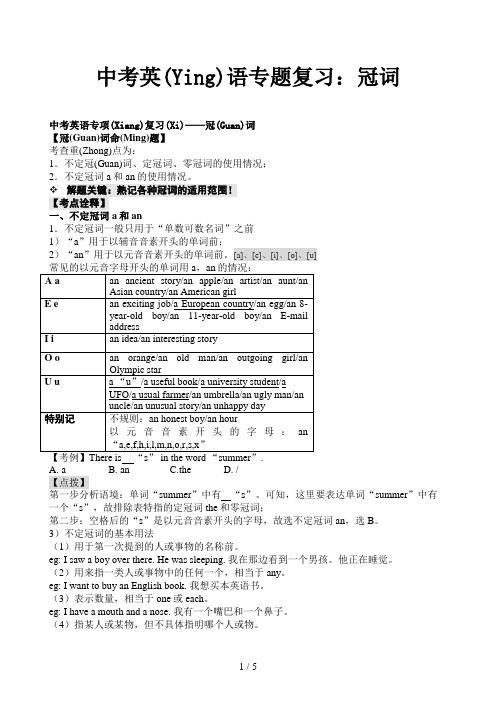
中考英(Ying)语专题复习:冠词中考英语专项(Xiang)复习(Xi)——冠(Guan)词【冠(Guan)词命(Ming)题】考查重(Zhong)点为:1.不定冠(Guan)词、定冠词、零冠词的使用情况;2.不定冠词a和an的使用情况。
❖解题关键:熟记各种冠词的适用范围!【考点诠释】一、不定冠词a和an1.不定冠词一般只用于“单数可数名词”之前1)“a”用于以辅音音素开头的单词前;2)“an”用于以元音音素开头的单词前。
[a]、[e]、[i]、[o]、[u]There is “A.aB. anC.theD. /【点拨】第一步分析语境:单词“summer”中有“s”。
可知,这里要表达单词“summer”中有一个“s”,故排除表特指的定冠词the和零冠词;第二步:空格后的“s”是以元音音素开头的字母,故选不定冠词an,选B。
3)不定冠词的基本用法(1)用于第一次提到的人或事物的名称前。
eg: I saw a boy over there. He was sleeping. 我在那边看到一个男孩。
他正在睡觉。
(2)用来指一类人或事物中的任何一个,相当于any。
eg: I want to buy an English book. 我想买本英语书。
(3)表示数量,相当于one或each。
eg: I have a mouth and a nose. 我有一个嘴巴和一个鼻子。
(4)指某人或某物,但不具体指明哪个人或物。
eg: A man is waiting for you at the gate. 有个(Ge)人在门口等你。
(5)表(Biao)示类别,泛指一类人或物。
eg: A horse is much bigger than a rabbit. 马比兔子大得(De)多。
(6)表(Biao)示(Shi)“每(Mei)一(Yi)”的(De)意思,相当于every。
eg: once a week 一周一次200 kilometers an hour 每小时200公里(7)用在such,quite,rather,half,what等词之后。
2024中考英语冠词知识点总结_0
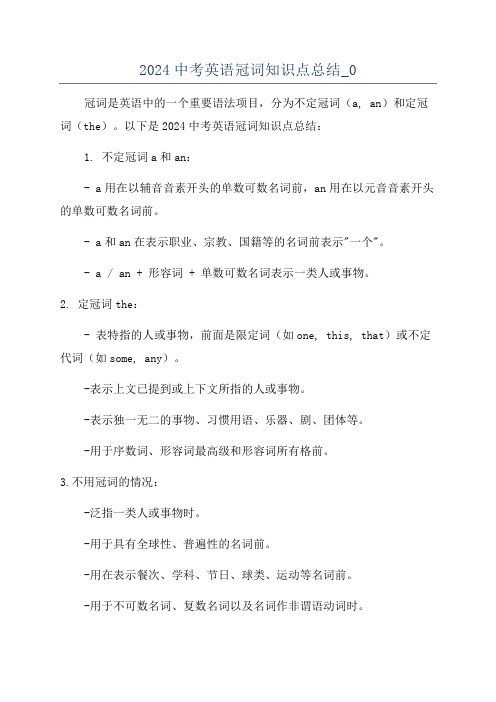
2024中考英语冠词知识点总结_0
冠词是英语中的一个重要语法项目,分为不定冠词(a, an)和定冠词(the)。
以下是2024中考英语冠词知识点总结:
1. 不定冠词a和an:
- a用在以辅音音素开头的单数可数名词前,an用在以元音音素开头的单数可数名词前。
- a和an在表示职业、宗教、国籍等的名词前表示"一个"。
- a / an + 形容词 + 单数可数名词表示一类人或事物。
2. 定冠词the:
- 表特指的人或事物,前面是限定词(如one, this, that)或不定代词(如some, any)。
-表示上文已提到或上下文所指的人或事物。
-表示独一无二的事物、习惯用语、乐器、剧、团体等。
-用于序数词、形容词最高级和形容词所有格前。
3.不用冠词的情况:
-泛指一类人或事物时。
-用于具有全球性、普遍性的名词前。
-用在表示餐次、学科、节日、球类、运动等名词前。
-用于不可数名词、复数名词以及名词作非谓语动词时。
4.冠词用法的特殊情况:
- 表示上面提到的一类人或事物时,用a / an表示"一个"。
- 与不定代词some, any, each, every和numeral连用时,不需要冠词。
- 在固定短语中,如by bus, in bed, at school等,不需要冠词。
总的来说,正确使用冠词需要根据名词的性质、上下文和习惯用法来决定。
掌握冠词的用法能够帮助我们准确表达和理解英语句子的意思。
九年级英语冠词知识点

九年级英语冠词知识点以下是九年级英语冠词知识点的详细介绍:一、冠词的定义和分类冠词是英语语法中的一类虚词,用于限定名词的范围和指向。
英语中的冠词主要分为三类:定冠词(the)、不定冠词(a/an)以及零冠词(即不使用冠词)。
二、定冠词(the)1. 定冠词的用法定冠词“the”用于特指某个人或物,在使用时需要注意以下几点:- 用于特指某个已知的人或物,或者上文中已经提到的人或物。
- 用于特指只有一个的事物,如地球、太阳等。
- 用于特指某类事物的整体,如:the sky(天空)、the sea(海洋)等。
2. 定冠词的特殊用法- 用于表示乐器、船只、学科等特定的事物,例如:the piano (钢琴)、the Nile(尼罗河)、the history(历史)等。
- 用于宇宙中的事物,例如:the moon(月亮)、the stars(星星)等。
三、不定冠词(a/an)1. 不定冠词的用法不定冠词“a”或“an”用于泛指某个人或物,在使用时需要注意以下几点:- “a”用于以辅音音素开头的词前面,例如:a book(一本书)、a dog(一只狗)等。
- “an”用于以元音音素开头的词前面,例如:an elephant(一头大象)、an hour(一个小时)等。
2. 当不定冠词与数词连用时- “a/an”与数词连用时,用来表示“每一个”的意思,例如:twice a week(每周两次)、five dollars an hour(一小时五美元)等。
四、零冠词有时候名词前不使用任何冠词,这种情况下称为零冠词。
以下几种情况使用零冠词:1. 名词前面用基数词或序数词表示的具体数量时,例如:two cats(两只猫)、first prize(第一名)等。
2. 名词前面用数词+单位名词时,例如:ten minutes(十分钟)、three times(三倍)等。
3. 名词前面用物质名词或抽象名词时,例如:water(水)、happiness(幸福)等。
初中英语中考语法难点详解冠词的基本用法

不定冠词
a,an 用 法
① 第一次提及某人某物,非特指; A boy is waiting for you. ② 泛指一类人或事,相当于 a kind of; A plane is a machine that can fly. ③ 用于时间、速度等名词前,相当于 every; We study eight hours a day. ④ 用于某些固定结构中; in a hurry; for a while; have a cold
不定冠词
【注意】
(1) a 用于以辅音音素开始的单词前,而 an 用于以元音音素开始 的单词前。 (2)以 u 开头的单词要注意,开头发[ʌ]音的单词用 an,开头发[ju:] 音的单词用 a。 (3)单词“one [wʌn]”的读音要注意,它的前面要用冠词 “a”
定冠词
the 的用法:
① 表示说话双方都了解的或上文提到过的人或事;
8.The city assigned a policeman to the school crossing because __C____
traffic there was so heavy. A .a B. an C. the D. one
巩固练习
9.A new teacher was sent to the village in place of ___B___ one who had
retired.
A. a B. the C. an D. its
巩固练习
1.When Linda was a child, her mother always let her have __C____ bed.
A. the breakfast in
(完整)初中英语专项语法讲解-冠词

冠词的用法【概念引入】冠词是一种虚词,它置于名词前,帮助说明名词的含义。
冠词本身不能单独使用,在句子中不重读。
冠词可以分为不定冠词和定冠词。
此外,在某些情况下是不使用冠词的,这种不使用冠词的情况叫做零冠词。
【用法讲解】1. 不定冠词的用法:不定冠词包括a/an,只用于单数可数名词前。
a用于以辅音音素开头的单词前,an用于以元音音素开头的单词前。
它们的意思相当于one, 但是不像one一样强调数量。
不定冠词在很多情况下可以译成“一”、“每”,有时可以不译出。
例如:There is a book on the table. 桌子上有一本书。
Please give me an apple. 请给我一个苹果。
不定冠词的具体用法包括以下几个方面:1)表示一类人或者一类事物中的一个。
例如:He’s an English teacher.他是个英语老师。
It’s an action movie. 这是一部动作片。
2)指某人或某物,但不具体说明是何人或何物。
例如:A girl is waiting for you at the school gate.一个女孩在校门口等你。
Is there a bank near here? 这附近有银行吗?3)用在时间、速度、价格等前,表示“每一”,相当于every。
例如:-How much are the oranges? 桔子多少钱?-Two yuan a kilo.每公斤两元。
I go to school five days a week.我一周上五天课。
4)用在某一些固定搭配的短语中。
例如:a lot of许多 a little/ a few 一点after a while 一会儿have a look 看一看have a good time 玩得高兴have a cold 感冒5)用在序数词前,表示“又一”,“再一”。
例如,I have three books. I want to buy a fourth one.我已经有三本书,我想买第四本。
考点01 冠词(考点详解)-备战中考英语考点微专题

考点01 冠词冠词三兄弟(a/ an;the)的任务就是给名词“戴帽子”。
语法上,它们是虚词,没有词义,也不能独立担任任何句子成分,只能附着在一个名词上,在名词前使用,帮助表明词义。
冠词分为两类:不定冠词a(an)和定冠词the。
不定冠词a(an)只能用于单数名词之前,表示“一”的意思和该名词的不特定性。
定冠词则强调该名词的特定性,表示“这”,“这些”等意思,在可数名词与不可数名词之前都能使用。
考查题型:冠词虽小,只有a,an和the三个,但却是历年各地中考必考语言点之一。
就考查题型而言,以单项选择为主,有时在完形填空中出现。
从命题意图看,以考查不定冠词a和an的用法区别、不定冠词和定冠词的用法区别为主。
同时考查冠词的各种不同用法。
考查重点:冠词的考查重点包括不定冠词a和an的用法,定冠词the的用法和零冠词的用法等。
其中,不定冠词与定冠词的用法区别以及在具体语言环境中冠词的应用是历年中考试题考查的热点,也是今后的考查方向。
一、不定冠词的用法。
二、定冠词的用法。
三、不用冠词的情况。
一、冠词的概述1、冠词的定义:冠词是用来表示名词特性的一种词,它表示名词可数还是不可数、单数还是复数、任何一个还是特定的一个等。
也就是说,冠词与名词是紧密连在一起的。
冠词主要放在名词之前,说明名词所表示的人或物,它不能离开名词而单独存在。
2、冠词的种类:(1)不定冠词:有a/an 两种形式。
“a”用在以辅音音素开头的词前面,“an”用在以元音音素开头的词前面。
判断一个词是以元音音素开头还是以辅音音素开头,是根据读音而不是根据字母。
(2)定冠词:只有the 一种形式。
3、冠词的泛指、特指和类指的用法:(1)泛指:指首次提到的、不限定的人或物。
(2)特指:指上文已提到的人或物,或是指被限制性修饰语在其后加以限定的人或物,也可以是指说话者双方都清楚的特定的人或事物。
(3)类指:表示类别4、冠词的用法:定冠词的用法口诀冠词基本用法【速记口诀】名词是秃子,常要戴帽子,可数名词单,须用a或an,辅音前用a,an在元音前,若为特指时,则须用定冠,复数不可数,泛指the不见,碰到代词时,冠词均不现。
中考英语语法--“冠词”用法知识点讲解
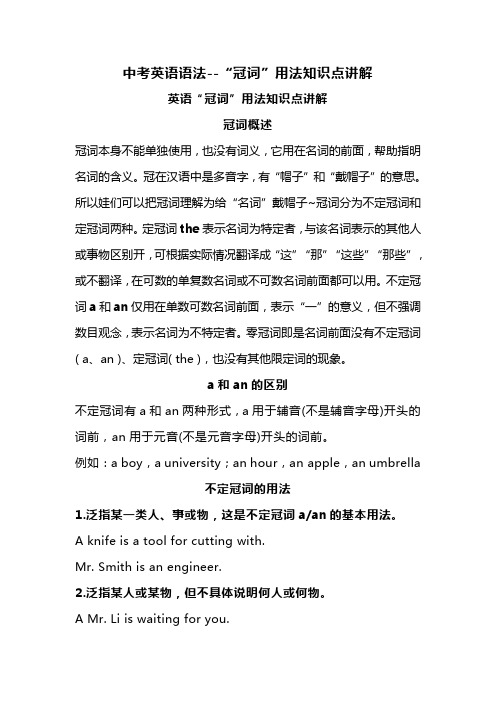
中考英语语法--“冠词”用法知识点讲解英语“冠词”用法知识点讲解冠词概述冠词本身不能单独使用,也没有词义,它用在名词的前面,帮助指明名词的含义。
冠在汉语中是多音字,有“帽子”和“戴帽子”的意思。
所以娃们可以把冠词理解为给“名词”戴帽子~冠词分为不定冠词和定冠词两种。
定冠词the表示名词为特定者,与该名词表示的其他人或事物区别开,可根据实际情况翻译成“这”“那”“这些”“那些”,或不翻译,在可数的单复数名词或不可数名词前面都可以用。
不定冠词a和an仅用在单数可数名词前面,表示“一”的意义,但不强调数目观念,表示名词为不特定者。
零冠词即是名词前面没有不定冠词( a、an )、定冠词( the ),也没有其他限定词的现象。
a和an的区别不定冠词有a和an两种形式,a用于辅音(不是辅音字母)开头的词前,an用于元音(不是元音字母)开头的词前。
例如:a boy,a university;an hour,an apple,an umbrella不定冠词的用法1.泛指某一类人、事或物,这是不定冠词a/an的基本用法。
A knife is a tool for cutting with.Mr. Smith is an engineer.2.泛指某人或某物,但不具体说明何人或何物。
A Mr. Li is waiting for you.一位李先生在等你。
3.表示数量,有“一”的意思,但数的概念没有one强烈。
There is a book on the desk.书桌上有一本书。
4.表示“每一”,相当于every.I go to school five days a week.我一周上五天课。
5.用在序数词前,表示“又一”,“再一”。
I have three books. I want to buy a fourth one.我已经有三本书,我想买第四本。
6.用在某些固定词组中定冠词的用法1.特指某(些)人或某(些)物,这是定冠词的基本用法。
冠词知识点

冠词冠词冠词冠词一、考点分析:中考对冠词的考查主要集中在以下几点:1.不定冠词a, an的用法区别。
2.定冠词the的用法。
3.不用冠词的情况。
4.习惯用语中冠词的用法。
考查冠词的形式一般为单项选择,有时也会在完形填空、完成句子等题中出现。
二、考点知识讲解:单数可数名词前一定要用冠词 a(n)泛指单一,每一,任一事物指类别the特指上文提到过的人或事物被限制性修饰语所限定的人或事物说话双方所默认的人或事物世上独一无二的事物指类别复数可数名词,不可数名词前the特指上文提到的人或事物被限制性修饰语所限定的人或事物说话双方所默认的人或事物零冠词泛指的人或事物指类别考考考考点点点点1 定冠词的用法定冠词的用法定冠词的用法定冠词的用法::::定冠词the与指示代词this,that同源,有“那(这)个”的意思,但较弱,可以和一个名词连用,来表示某个或某些特定的人或东西。
1.特指双方都明白的人或物。
Take the medicine.把药吃了。
2.上文提到过的人或事。
He bought a house. I've been to the house. 他买了幢房子。
我去过那幢房子。
3.指世上独一无二的事物或用于对两个人或事物比较时起特指作用的比较级前。
He is the taller of the two boys.两个男孩中他较高点。
the fox (狐狸),the sun, the sky, the moon, the earth 4.与单数名词连用表示一类事物,如:the dollar“美元”;或与形容词或分词连用表示一类人,如:the rich“富人”;the living“生者”。
5.用在序数词和形容词最高级及形容词only, very, same 等前面。
Where do you live?I live on the second floor. 你住在哪?我住在二层。
That's the very thing I've been looking for. 那正是我要找的东西。
中考英语冠词句型知识点归纳 及解析

中考英语冠词句型知识点归纳及解析一、选择题1.Poverty (贫困) is a big problem, but China has done ________ good job of dealing with it. A.a B.an C.the D./2.—Is this ________ new computer your mother gave you as your birthday present?—Yes. I have never seen ________ better one before.A.the; a B.a; a C.a; the D.the; the3.─ How far is it from this hotel to station?─ It is eleven-kilometer walk from here.A.the; an B.the; a C.a; an D.a; the4.—Jim took ___ one-hour ride just now. What a short time he spent finishing such a long way!—He is ______ experienced rider.A.an; the B.a; the C.a; an D.an; a5.Tiger Watch, _______ 80-minute documentary, won_______ award for its amazing photography.A.an; an B.an, aC.a, an D.the; a6.There is_______ "s" and_______ "u" in the word "sun".A.a, an B.an, a C.a, a D.an, an7.It’s ____ unusual chance for Mr White to get such ______ useful advice.A.an; / B.a; anC.a; the D.an; an8.- Where Are We Going Dad has become one of China's most popular TV shows.- Yes._______ film with the same name as_______ TV show will hit screens in 2014. A.The;/ B.A; a C.The; a D.A; the9.I know this plan is far from perfect, but I just can’t think of _____ one.A.a better B.the better C.a best D.the best 10.Cao Dewang, ________ business man, plan to donate 10 billion yuan to build a public university.A.a B.an C.the D./11.— Is Russia _____ European country?— Yes, though a large part of it is in _____ Asia.A.a; a B.an; the C.a; / D.an; /12.The year 2021 marks ________ beginning of China’s l4th Five-year Plan period.A.a B.the C.an D./13.We all know the Earth is ________ only home to everyone. Let’s try to make it ________ greener world to live in.A.the; a B./; the C./; a D.the; the 14.April is ________ fourth month of the year. It’s ________ very pleasant month.A.the; the B.the; a C.the; / D.a; a15.According to the picture, the Communist Party of China has a history of hundred years.A.a B.an C.the D./ 16.—Peter, you’ve worked for three hours without a break!—I need ________ useful idea for my design, so I’m busy searching for some information. A.a B.an C./ D.the17.The UK, ________ island country with ________ long history, is made up of England, Scotland, Wales and Northern Ireland.A.a;a B.a;/ C.an; a D.an;/ 18.Denmark, ________ European country, is worth a visit.A.a B.an C.the D./19.—It’s a pity that Wu Mengda died of illness a few months ago.—Yes. We felt the loss of ________ great actor.A./ B.a C.an D.the20.We feel quite sad about ________ death of Yuan Longping, “Father of Hybrid Rice”. What ________ great loss it is!A.the; / B.a; the C.the; the D.the; a21.Do you think that little boy should know the road safety?A.so B.such C.so a D.such a22.He who has never been to the Great Wall is not ________ true man.A.an B.a C.the D./23.— Nanjing, ________ capital of Jiangsu Province, is ________ ancient city.A.the; a B.an; an C.an; a D.the; an 24.— What are you reading, Jim?— ______ introduction to the art festival written by ______ university student.A.An; a B.An; an C.A; the D.A; an25.Life is one-way road. No matter how you change, it will not go back.A.the B.a C.an D.\26.Life is full of _____ chances, but they're not always _____ ones we hope for.A./; the B.the; the C./; / D.the; /27.In 1985, Spud became___ NBA player and in 1986, he came___ first in the Slam Dunk Contest.A.an; the B.a; the C.an; /D.a; /28.- Have you ever seen ______ Chinese movie Wolf Warriors 2 ?-Sure . It’s such an exciting film that I want to see __________second tim e.A.the; a B.an; / C.a; a D.the; the 29.—Do you think it’s ______ good fruit juice advertisement?—Of course. I can’t wait to try ______ bottle of it.A./; a B.a; a C.a; the D./; the 30.John’s uncle is ______ IT engineer, and he usually develops a new t ype of software every ________ few months.A.the; a B.an; a C.a; / D.an; / 31.Thailand is ________ Asian country and it is a good place to visit.A.a B.an C.the D./32.The film Coco is big success that many people go to the cinema to watch it.A.such B.such a C.so D.so a33.Most people think that capital of the movie world is Hollywood, in the United States. A.a B.an C.the D./34.-Which of the twin sisters is easier to get on with?-________ younger one. She is ________ humorous girl.A.The; the B.The; a C.A; a D.A; the35.Life has ________ value only when ________ has something valuable as its purpose. A.an; / B.the; it C./; one D.a; it36.There is ________ “N” letter on my T-shirt because this is ________Year of Ox.A.a; / B.an; / C.a; the D.an; the 37.—What ________ big surprise! Peter has passed ________ final exam with all his efforts. —Congratulations!A.a; a B.a;the C./; a D./ ;the 38.——Pass me _____________ magazine on the shelf,please,Jim.——But it’s not ____________ new magazine,Dad. You have already read it,haven’t you?A.the ;a B.the ;the C.a;a D.a; the 39.—What would you like to be when you grow up? —host like Zhu Jun.A.A B.An C.The D./40._____ Nantong today is more beautiful than before.Mr.Jackson said he would visit it ____ third time.A.The ; a B.The ; the C./; the D./; a【参考答案】一、选择题1.A解析:A【详解】句意:贫困是一个大问题,但中国在解决这个问题上做得很好。
中考英语语法学习之冠词知识归纳

初中英语语法学习之冠词知识归纳(一)概说冠词是英语语法中的一个重要概念,用于表示名词所指的物体或概念的特定或不特定。
在英语中,有两种冠词:定冠词和不定冠词。
定冠词 the 用于指特定的人、事、物,例如:I saw the movie yesterday.(我昨天看了那部电影。
)不定冠词 a/an 用于指不特定的人、事、物,例如:I saw a bird in the park.(我在公园里看到了一只鸟。
)需要注意的是,有些名词在使用时需要特定的冠词,例如:专有名词(如人名、地名、机构名等)通常使用定冠词 the,例如:The United States of America.(美国)普通名词的首字母大写时通常使用不定冠词 a/an,例如:A cat is a common pet.(猫是一种常见的宠物。
)另外,在某些情况下,冠词也可以省略,例如:在不特定的上下文中,通常省略定冠词 the,例如:I saw something strange in the corner.(我在角落里看到了一些奇怪的东西。
)在非正式的场合中,通常省略不定冠词 a/an,例如:I want to eat pizza.(我想吃披萨。
)2.冠词的基本意义不定冠词 a/an 和数词 one 同源,都表示“一个”的意思,通常用于可数名词单数前。
例如:I saw a bird in the park.(我在公园里看到了一只鸟。
)需要注意的是,不定冠词 a/an 与数词 one 的使用方式不同。
在英语中,通常使用 a/an 来表示单数可数名词,而使用 one 来表示单数不可数名词。
例如:A book is a good way to learn new information.(一本书是学习新知识的好途径。
)One apple a day keeps the doctor away.(一天一个苹果,医生远离我。
)另外,在某些情况下,不定冠词 a/an 也可以表示复数可数名词,而使用 one 则表示复数不可数名词。
人教版中考英语专项讲解-冠词

人教版中考英语专项讲解-冠词冠词1. 中考对冠词掌握程度的要求:理解冠词的基本用法。
2. 冠词在英语词汇中占的比例不大,但是历年中考试题都要涉及,分值在1-2分,常以单项选择的形式出现。
3. 攻克方法:全面掌握中学阶段所学的英语知识,归纳总结定冠词、不定冠词的用法,尤其是一些特殊用法。
一、知识精讲冠词是虚词,放在名词之前,用来说明名词指的人或事物。
冠词有两种。
a /an 叫不定冠词,the叫定冠词。
a用在辅音之前,an用在元音之前。
(一)不定冠词的用法:(二)定冠词的用法:巧记定冠词the用法歌诀:特指双方熟悉,上文已经提起。
世上独一无二,方位名词乐器。
某些专有名词,还有姓氏复数。
序数词最高级,习惯用语牢记。
(三)不用冠词的情况:状元典例1This building is ______ university.A. aB. anC. theD. /答案:A思路分析:本题考查的是不定冠词a 和an 的用法。
a用于以辅音音素开头的单词前,而an用于以元音音素开头的单词前,而不是以元音字母开头的单词前。
university的第一个音素是[j],所以用a而不用an。
"a"用在以辅音音素开头的单词前,而不是辅音字母前;"an"用在以元音音素开头的单词前,而不是元音字母前,(例如hour,第一个音素是"а",故用an。
当字母单独出现时A E I O R S F H L X 也要使用不定冠词"an",其次特别要注意的是,U这个字母单独出现时发的并不是元音,同理UNIVERSITY USUAL也都不用不定冠词"an"。
但UNCLE要用"an")。
确定用"a"还是"an",有一个口诀:不见"原因(元音)"别施"恩(n)"。
初中中考英语冠词讲解

初中中考英语冠词讲解一、冠词的概念冠词是一个虚词,它置于名词之前,限定名词的意义.冠词可分为定冠词,不定冠词和零冠词三类。
二、不定冠词:a/an1.a用于辅音发音开头的词前,而不是辅音字母前面,如:a book, a desk;有些单词虽然是以元音字母开头,但需用a修饰,这些单词可以连成一句话:In a university, a European united a one-eyed man to steal a useful thing,then ran away along a one-way road. This is a usual thing。
在一所大学里,一个欧洲人联合独眼龙偷了一件有用的东西,然后沿着一条单行道逃跑了。
这是一件平常的事.2.an用于元音发音开头的词前,而不是元音字母前,如:an apple, an hour.有些单词虽然是以辅音字母开头,但发音却是以元音开头,这些单词可以连成一句话:An hour ago, an honest man accepted an honorable task.一个小时以前,一个诚实人接受了一项光荣的任务.a/an的用法:1. a/an 用于单数可数名词前,表示“某一"“一…"或者“一个”的意思.a book a boy a man a bird a dog an houran interesting book a big dog a dangerous animal2.表示类别:这种用法是指某人或某物属于某一种类,或者指某一种类的人或物中的任何一个或一件,或者指某一种类的人或物,但不具体说明是何人或何物. 例如:That is a pen, not a pencil。
那是钢笔而不是铅笔。
(指属于某一种类)Give him a pear,please!请给他一个梨。
(指某一种类中的任何一个)An elephant is bigger than a horse。
2024年中考英语语法学习之冠词分类及用法

2024年中考英语语法学习之冠词分类及用法冠词是英语语法中最基础的部分之一,也是考试中最常见的考点之一。
在学习英语时,掌握冠词的使用方法是非常重要的。
下面我们将从冠词的分类、用法和注意事项三个方面来进行讲解。
一、冠词的分类冠词分为定冠词(the)和不定冠词(a/an)两种。
定冠词(the)定冠词是指用来表示特指某个事物的冠词,如the。
在英语中,定冠词通常用在名词的前面,表示特定的人、事、物或概念。
例如,The cat is on the mat.(这只猫在垫子上。
)在中文中,定冠词通常用“的”来表示,例如,这是女儿的家。
在句子中,定冠词的位置通常是名词的前面。
需要注意的是,在某些情况下,定冠词也可以省略,例如,她很漂亮。
在这种情况下,“的”可以省略,变成“她漂亮”。
不定冠词(a/an)不定冠词(a/an)是用来表示泛指的冠词,通常用在名词前,表示不确定的人、事、物或概念。
在英语中,不定冠词通常用“a”来表示,例如,I saw a bird in the park.(我在公园里看到了一只鸟。
)在中文中,不定冠词通常用“一个”来表示,例如,我要一个苹果。
需要注意的是,在某些情况下,不定冠词也可以省略,例如,他来了。
在这种情况下,“一个”可以省略,变成“他来”。
I saw a bird in the park yesterday. (昨天我在公园里看到了一只鸟。
)We need to buy an apple for breakfast. (我们需要买一个苹果作为早餐。
)二、冠词的用法表示特指某一个人或事物的冠词是定冠词(the)。
在句子中,定冠词通常用在名词的前面,例如,The dog is sleeping on the mat.(这只狗正在垫子上睡觉。
)在中文中,表示特指某一个人或事物的冠词也是“的”,例如,这是女儿的家。
需要注意的是,在某些情况下,定冠词也可以省略,例如,她很漂亮。
在这种情况下,“的”可以省略,变成“她漂亮”。
中考英语语法:冠词的九个考点+五个难点+易错点
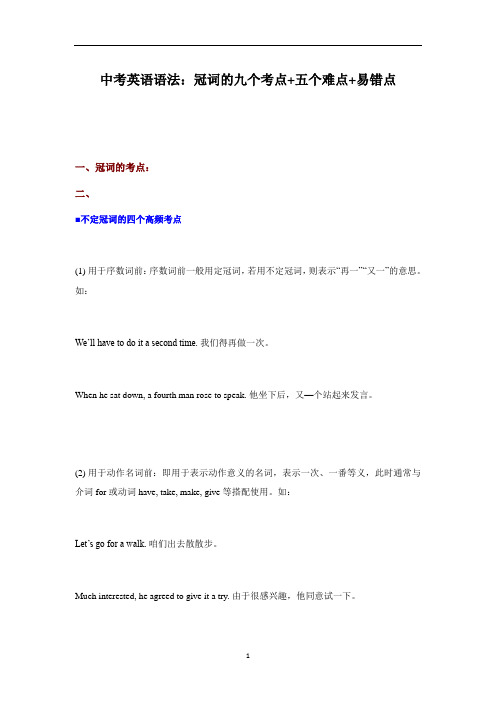
中考英语语法:冠词的九个考点+五个难点+易错点一、冠词的考点:二、■不定冠词的四个高频考点(1) 用于序数词前:序数词前一般用定冠词,若用不定冠词,则表示“再一”“又一”的意思。
如:We’ll have to do it a second time.我们得再做一次。
When he sat down, a fourth man rose to speak. 他坐下后,又—个站起来发言。
(2) 用于动作名词前:即用于表示动作意义的名词,表示一次、一番等义,此时通常与介词for或动词have, take, make, give 等搭配使用。
如:Let’s go for a walk.咱们出去散散步。
Much interested, he agreed to give it a try. 由于很感兴趣,他同意试一下。
(3) 用于人名前:相当于a certain,意为“一个”“某个”。
如:A Mr. Johnson came to see you while you were out. 你不在时有位叫约翰逊的先生来看你。
(4) 用于抽象名词前:使之具体化,表示与该之相关的具体的人或事。
比较:Hard work is the way to success. 苦干是成功之路。
(success为抽象名词,不可数,其前不能用不定冠词)I’m anxious that the party should be a success.我盼望这次聚会圆满成功。
(success表示“成功的事”,可数,连用不定冠词)■定冠词的五个高频考点定冠词的用法比较复杂,除表示特指外,还可表示独一无二的事物、用于最高级前、用于序数词或方位词之前、用于乐器名词前、用于江河湖海等前等。
这些用法大家一般都比较熟悉,而且在考试中出现的机会也相对较少,下面为同学们归纳的是几条大家易错而且高考比较常考的用法:(1) 用于复数姓氏前:即用于在姓氏的复数形式之前表示一家人或夫妇二人。
初三知识点总结冠词的用法与区别

初三知识点总结冠词的用法与区别初三知识点总结:冠词的用法与区别冠词是英语语法中常用的一种词类,用来限定名词的特定用法。
在英语中,冠词分为三类:定冠词(the)、不定冠词(a/an)和零冠词(无冠词)。
本文将详细介绍冠词的用法和区别。
一、定冠词(the)定冠词“the”是英语中使用最频繁的冠词。
它用于特指已知的人、事物或概念。
定冠词可以用在单数名词和复数名词前。
1. 特指已知的人或事物:- "请递给我那本书。
"(Pass me the book.)在这个例句中,使用了定冠词“the”来特指已知的书。
- "我喜欢看电影。
"(I like watching movies.)在这个例句中,没有使用定冠词,因为是泛指的情况。
2. 表示某个类别中的特定事物:- "狗是人类最好的朋友。
"(Dogs are man's best friend.)在这个例句中,没有使用定冠词,因为是泛指的情况。
- "这条狗是自己饲养的。
"(The dog is my own pet.)在这个例句中,使用了定冠词“the”来表示特指。
3. 特指地理位置或物体上的部分:- "请把杯子放在桌子上。
"(Please put the cup on the table.)在这个例句中,使用了定冠词“the”来特指已知的桌子和杯子。
二、不定冠词(a/an)不定冠词“a/an”用于泛指一个人、事物或概念。
它用在单数可数名词前。
在选择使用“a”还是“an”时,取决于名词的音素(发音)。
1. 使用“a”:- "我买了一本书。
"(I bought a book.)在这个例句中,使用了不定冠词“a”来泛指一本书。
2. 使用“an”:- "我看到了一只小鸟。
"(I saw an bird.)在这个例句中,使用了不定冠词“an”来泛指一只小鸟。
中考英语冠词的用法总结

中考英语冠词的⽤法总结中考英语冠词的⽤法总结【知识梳理1】冠词概述1.冠词是虚词,本⾝不能单独使⽤,也没有词义,它⽤在名词的前⾯,帮助指明名词的含义。
2.冠词分为不定冠词和定冠词两种:不定冠词⽤于单数可数名词之前,通常带有“⼀”、“某⼀”、“⼀种”的含义;定冠词则表⽰名词为特定者,表⽰“这”、“那”、“这些”、“那些”的意思,在可数的单复数名词或不可数名词前⾯都可以⽤。
另外不能加冠词的情况被称之为零冠词。
【知识梳理2】不定冠词的⽤法(a/an)Q1:不定冠词有哪些⽤法或者含义?Q2: a/an有什么区别?Q3:26个字母当中哪些字母是元⾳⾳素开头?◎请注意这两种表达法的区别:take an active part intake part in【例题精讲】例1. Elaine always tells us that studying in Australia was ______ important experience in her life.A. aB. anC. theD. /例2. Kitty is such ______honest student that she is often praised by her teachers.A. aB. theC. anD. /【巩固练习】填⼊不定冠词1._____ old lady2.______ hour3.______uncle4.________useful book5._____S6.______D7.______100-word report13._____ 8-year-old boy 14.______ event 15._____Chinese restaurant【知识梳理3】定冠词的⽤法1、特指某(些)⼈或某(些)物,这是定冠词的基本⽤法。
2、指谈话双⽅都知道的⼈或事物。
3、指上⽂已经提到的⼈或事物。
4、指世界上独⼀⽆⼆的事物。
中考英语《冠词、数词、介词与连词》考点详解
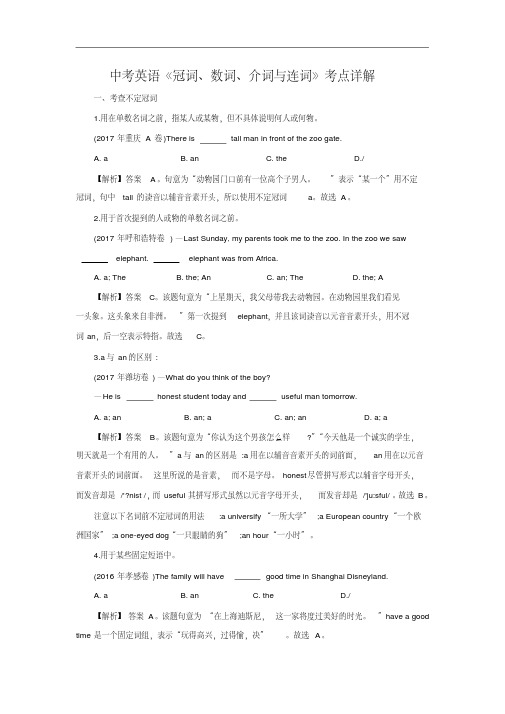
中考英语《冠词、数词、介词与连词》考点详解一、考查不定冠词1.用在单数名词之前,指某人或某物,但不具体说明何人或何物。
(2017年重庆A卷)There is tall man in front of the zoo gate.A. aB. anC. theD./【解析】答案A。
句意为“动物园门口前有一位高个子男人。
”表示“某一个”用不定冠词,句中tall的读音以辅音音素开头,所以使用不定冠词a。
故选A。
2.用于首次提到的人或物的单数名词之前。
(2017年呼和浩特卷)—Last Sunday, my parents took me to the zoo. In the zoo we saw elephant. elephant was from Africa.A. a; TheB. the; AnC. an; TheD. the; A【解析】答案C。
该题句意为“上星期天,我父母带我去动物园。
在动物园里我们看见一头象。
这头象来自非洲。
”第一次提到elephant,并且该词读音以元音音素开头,用不冠词an,后一空表示特指。
故选C。
3.a与an的区别:(2017年潍坊卷)—What do you think of the boy?—He is honest student today and useful man tomorrow.A. a; anB. an; aC. an; anD. a; a【解析】答案B。
该题句意为“你认为这个男孩怎么样?”“今天他是一个诚实的学生,明天就是一个有用的人。
”a与an的区别是:a用在以辅音音素开头的词前面,an用在以元音音素开头的词前面。
这里所说的是音素,而不是字母。
honest尽管拼写形式以辅音字母开头,而发音却是/'?nist /,而useful其拼写形式虽然以元音字母开头,而发音却是/'ju:sful/。
故选B。
注意以下名词前不定冠词的用法:a universify“一所大学”;a European country“一个欧洲国家”;a one-eyed dog“一只眼睛的狗”;an hour“一小时”。
- 1、下载文档前请自行甄别文档内容的完整性,平台不提供额外的编辑、内容补充、找答案等附加服务。
- 2、"仅部分预览"的文档,不可在线预览部分如存在完整性等问题,可反馈申请退款(可完整预览的文档不适用该条件!)。
- 3、如文档侵犯您的权益,请联系客服反馈,我们会尽快为您处理(人工客服工作时间:9:00-18:30)。
中考英语冠词讲解与考点分析冠词是中考单项填空必考的语法项目之一,一般每年有一道小题,两个空。
因为冠词用法比较灵活,往往随着语境的变化而变化,并且固定搭配和特例较多,失分的考生比较多。
本文将结合中考试题,归纳冠词的考点。
第一部分:基础知识一、冠词概述冠词是虚词,它不能单独使用。
只能附在一个名词上说明这个名词。
冠词分为不定冠a(an)词和定冠词the。
不定冠词一般表示泛指;定冠词一般表示特指。
二、不定冠词a(an)的用法A. 不定冠词a(an)用于单数可数名词前。
a用于辅音字母开始的词前;an用于元音字母开始的词前。
如:a girl an English bookB. 不定冠词用来表示类别,指某一类人或某一类事物中的一个(泛指)。
如:His father is a doctor.I work in a middle school in Beijing.C. 不定冠词用于单数可数名词前,可以表示其全类(泛指)。
如:An English teacher teaches the students how to learn English.三、定冠词the的用法①表示上文提到过的人或事物。
如:He bought an English-Chinese dictionary this morning.The dictionary is very good.②用于单数可数名词前,表示整体或类别。
如:The panda is a rare animal.此句等于:A panda is a rare animal. = Pandas are rare animals.③用来表示世界上独一无二的事物。
如:the sun, the moon, the sky, the earth, the world④用于表示阶级、党派的名词前。
如:the Chinese Communist Party, the working class the proletariat 无产阶级⑤常用于含有普通名词或形容词的专有名词前。
A. 用于许多江海,山脉,群岛等名词前:The Yellow River The East Sea the Himalayas the Pacific OceanB. 用于由普通名词构成的国名:The People's Republic of China the United StatesC. 用于机关、团体、朝代、时代、报刊杂志等名词前:the United Nations the State Council the Tang dynastythe People's Daily the Summer Palace the Peace Hotelthe British Museum⑥用于表示方位的名词前。
如:the east the southwest the middle the Far East on the left⑦用于乐器名词前,但汉语拼音的乐器前不用冠词。
如:play the piano play the violin play erhu⑧用于复数的姓氏前,表示两夫妇或全家,在此情况下,这类名词作复数对待。
如:When we got there, the Lius were waiting for us.The Smiths watch TV every day.⑨用于某些形容词或过去分词前,表示一类人或事物。
如:the poor the rich the living the youngthe wounded the oppressed the beautiful⑩用在形容词的最高级前或序数词前。
如:Shanghai is the biggest city in china.After the game, the first thing they wanted to do was to take a hot bath.四、零冠词用法①表示某一类人或事物的复数名词前,不用冠词。
Now people are living a happy life.Trees are planted everywhere.②不含普通名词的专有名词,表示泛指的物质名词和抽象名词前,不用冠词。
We are studying English.He is leaving for America this year.It is pleasant to walk in soft snow.Love is always stronger than hatred.③名词前有指示代词、物主代词、不定代词或名词所有格修饰,不用冠词。
I like this picture better.Is that your book?Take their chairs away!I do not have any money on me.As time went on, Einstein's theory proved to be correct.④季节、月份、星期等名词前,一般不用冠词。
She likes spring while I like summer.We have no classes on Saturday.The Long March started in October 1934.⑤表示只有一人担任的职务、头衔的名词前,不用冠词。
We have elected him our monitor.⑥三餐饭的名词前,一般不用冠词。
When do you have lunch?After supper we usually take a walk.⑦节假日等名词前,不用冠词。
Children all wear their best clothes on National Day.People give gifts to each other on Christmas Day.注意:在eve后有of短语则要加定冠词:on the eve of National Dayon the eve of New Year’s Day⑧球类和棋类运动的名词前,不用冠词。
play basketball play chess⑨作表语用表示程度的形容词最高级前,不用冠词。
Your help was most timely.This method is most effective.注意:如果有比较范围,形容词最高级前必须加定冠词:Of all methods, this is the most effective.⑩在某些固定词组里,名词前不用冠词。
on foot by train/ boat / plane…in fact as a matter of fact in class in church in danger in hospital in town in bed at home at school at daybreak at sunrise at dusk at sunset at night at noon go to school go to class go to bed from morning till nightfrom victory to victory from door to door五、注意事项①当man作人类讲时,用零冠词。
Man will conquer nature.②某些抽象名词具体化时是可数名词,其前可加a。
surprise, fire, joy,He is a success as a teacher.Long Jing is a famous tea in China.③ a 用于姓氏前表示某个只知道名字而不不熟悉的人。
A Mr Liu is waiting to see you outside.④在某些句型中可加aIt is a pity that you have missed the chance.It is a shame / a pleasure / a honour for sb. to do sth.⑤word 作消息讲时,用零冠词。
Word came that he would go abroad.第二部分:考点分析考点1 不定冠词一、用于单数可数名词前,表示泛指,相当于“any”,说明事物的种类或类属。
例题:1.It is often said that __________ teachers have __________ very easy life.A. 不填;不填B. 不填;aC. the, 不填D. the, a提示:这里的a very easy life(简单的生活)表示泛指。
答案:B2.When you come here for your holiday next time, don\'t go to________hotel; I can find you________bed in my flat.A. the; aB. the; 不填C. a; theD. a; 不填提示:此处bed表示泛指,意思是“我能在我的公寓里为你找到一张床”。
答案:A二、用于单数可数名词前,表示某一个,相当于“a certain”。
例题:1.I knew ______ John Lennon, but not ______ famous one.A. 不填;aB. a;theC. 不填;theD. the;a提示:有一个叫John Lennon的人,用不定代词,表示某一个。
答案:B2.I can't remember when exactly the Robinsons left __ city. I only remember it was ____Monday.A. the, theB. a, theC. a, aD. the, a提示:某个星期天是a Monday。
答案:D三、不定冠词a用于辅音音素开头的单词前,an用于元音音素开头的单词前。
例题:The Wilsons live in ______ A-shaped house near the coast. It is ____ 17th century cottage.A. the ; 不填B. an; theC. 不填; theD. an; a提示:因为a 属于元音音素,应该用an;答案:D四、不定冠词位于抽象名词前,与抽象名词连用,使抽象名词具体化,表示“一场、一次、一件”。
如:a pleasure一件乐事,a surprise一件令人惊讶的事,a joy一件高兴的事,a pity一件遗憾的事,an honour一个(件)经以为荣的人(事)。
